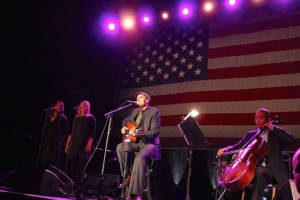OATHS BROKEN, OATH KEEPERS BOWED: Sentences for 2 more in marquee Jan. 6 conspiracy case
Raw emotions positively dominated a federal courthouse in Washington, D.C. this week as the Justice Department secured significant sentences for two more Oath Keepers involved in a larger conspiracy to forcibly stop America’s transfer of power on Jan. 6, 2021.
On the heels of an 18-year-sentence delivered to a defiant Elmer Stewart Rhodes, the leader of the far-right group, and a 12-year-sentence handed down to Kelly Meggs, Rhodes’ deputy on the 6th, U.S. District Judge Amit Mehta sentenced Oath Keeper Jessica Watkins, once the founder of the Ohio Regular Militia, to 8.5 years and Kenneth Harrelson, a ground team leader on the 6th, to four years. Both were acquitted of the sedition charge in this case but they were found guilty of multiple felonies including serious obstruction charges. Sedition itself is rarely prosecuted in the United States and rarer still are these prosecutions successful since the bar to prove this sort of conspiracy is set so high.
This week marked a victory for the Justice Department, the rule of law, and the victims of Jan. 6 even if Donald Trump, the man who started it all, has yet to bear any real legal responsibility for his role in inciting an attack on the U.S. Capitol to stay in power.
That day may come. But in the meantime, the willing pawns in Trump’s betrayal of the U.S. Constitution and common decency alike will now begin to serve their time.
Underlining the severity of events, prosecutors initially sought an 18-year sentence for Watkins noting the jury’s conclusion that her true objective on Jan.6 was to storm the Capitol, use her body—and the bodies of her recruits—to violently obstruct the certification of the 2020 election, and intimidate Congress and impede police.
Judge Mehta told a highly emotional Watkins in court Friday that though she was acquitted of the most serious charge, at the time of Jan. 6 she was nevertheless a self-professed Oath Keeper who conspired to mar and disrupt democratic proceedings and lead recruits who, he believed, wouldn’t have been there but for her leadership. That would include, Mehta noted, Oath Keepers Bennie and Sandra Parker. She also led Donovan Crowl and Graydon Young into the fray.
Watkins was on the Nov. 9, 2020, GoTo Meeting with Stewart Rhodes and other Oath Keepers, where, Judge Mehta described, the origins of a violent conspiracy began to emerge. Before sentencing, the judge told her she “knew exactly what Rhodes had said, [and] was listening carefully on the call.”
In that meeting, Rhodes said he had abandoned all hope of a peaceful way to keep Trump in office or stave off a civil war. There was “nothing left but to fight,” and “we’re not getting out of this without a fight,” he said in November 2020.
He was primed for violence and ready to issue orders. Watkins was ready to take them.
She would ask Rhodes then about providing weapons for Oath Keeper events, Mehta noted, pointing to a discussion about transporting altered, weaponized pool cues. She and Oath Keeper Donovan Crowl called them “nightsticks.”
The foreseeable violence of Jan. 6 was evident in her constant willingness to prepare for it in the days and weeks leading up to the certification, Mehta said. And on that day, Watkins used an “aggressive, assaultive” posture and was “purposeful” as she coursed through the Capitol. Communications between her and others like Oath Keeper Donovan Crowl showed she wasn’t in D.C. merely to provide a security detail for Trump VIPs or to protect Trump supporters attending speeches like she and her defendants argued at trial.
She understood why Oath Keepers had set up the arsenal of weapons they dubbed a “quick reaction force” or a “QRF” at a hotel in northern Virginia, Mehta said. She brought an AR-15 from her home base of Ohio to Winchester, Virginia on the 6th. At trial, she said she decided to leave it at Crowl’s property there because she worried cleaning staff at the hotel outside of D.C. (the QRF) would “freak out” if they saw them.
In court Friday, Mehta told Watkins he believed she would have gone to get weapons if Rhodes had asked her and it was “small comfort” that she had left her own personal weapon further behind.
In any event, it is unlikely Watkins would have needed to drive hours back to Winchester anyway: The arsenal at the hotel in Arlington, Virginia, was just over the Potomac River from the U.S. Capitol, and it had more weapons than Oath Keeper Terry Cummings had seen in one place since his time in the military, he testified in October.
Watkins was part of the first stack, or line formation, inside of the Capitol. Leading the group on the ground was Kelly Meggs. He was sentenced to 12 years for seditious conspiracy earlier this week. Watkins used Zello, a walkie-talkie messaging app to communicate her maneuvering inside the Capitol and Mehta said there was no doubt that she pushed her way past police and headed toward the Senate. She could be seen and heard in footage urging “push! push! push!” and encouraging rioters to overrun police.
Watkins kept some of her communications tied to Jan. 6 intact but others she deleted, and this, both the jury and Judge Mehta concluded, indicated an intent to conceal her activities and obstruct an investigation into her crimes after she was identified in press reports in the wake of the attack. He told Watkins he didn’t know if there was a direct connection between Rhodes’ orders to Oath Keepers to delete communications after the 6th and her decision to remove her own communications but he considered it obstruction nonetheless.
Mehta agreed to a terrorism enhancement sought by the Justice Department but still went below the guidelines. He was sympathetic to her and her background. Watkins is transgender and she had a difficult upbringing in a strict religious household. Once in the Army she temporarily went AWOL because of harassment from a bunkmate who discovered her online searches involving gender identity. Her military service didn’t earn her any special deference at sentencing.
“I don’t think you’re Stewart Rhodes. I don’t think you’re Kelly Meggs. But your role in those events was more than a foot soldier. I think you can appreciate that,” Mehta told her in court Friday.
She nodded slightly as he spoke to her.
Watkins was racked with emotions during the sentencing hearing. She burst into tears the moment she took the podium and it was her chance to ask for mercy from the court. After somewhat composing herself, she spoke loudly though often her voice would quake as her tears flowed. She clutched a tissue for a few moments as she spoke. Her face flushed.
“I wrote this letter to you today to express my feelings of remorse considering my participation in Jan 6. As I said previously, my actions and behaviors that fateful day were wrong and as I now understand, criminal. This is what has brought me before you today and why you must hold me responsible. The events of Jan. 6 are unfortunate and while I believe in peaceful protest and redress of government, violence is never the answer,” Watkins said.
She expressed her “strong” frustration with people who assaulted police and told Judge Mehta since she had been incarcerated she had studied video evidence online and emphatically claimed she had “solved the crime” of a police assault on Jan. 6 unrelated to her case.
She also said she accepted that “her actions in and around the Capitol inspired those people to a degree.”
“They saw me there and that probably fired them up,” she said, noting how Oath Keepers were pat on the back as they ascended the Capitol steps.
“At trial, I said I was an idiot for going in there. But idiots can be held responsible and this idiot must be held responsible,” she said.
Watkins cried as she left the stand, saying she still loved her country and that it was never her intent to harm it or anyone. She regretted that Metropolitan Police Officer Christopher Owens was not present Friday. She wanted to personally apologize again though she aired the same sentiments at trial while he was in the courtroom. Owens, who was on the receiving end of Watkins’ push inside the Capitol, issued a poignant and painful victim impact statement two days before her sentencing. She was present for it but unable to address him then.
Judge Mehta’s empathy for Watkins was substantial. She had overcome a lot, he said. And in a tone that sounded stern yet near fatherly, the federal judge looked at Watkins earnestly, telling her he believed she was someone who could one day be a role model for others.
“I’m happy you have found someone who loves you. You and he tried to make a go of it with your own business… you served as a firefighter and a medic, and frankly, I do believe that the purpose of the Ohio State Regular Militia was not to battle our government,” Mehta said. “But somewhere along the line, that all got waylaid and perverted. I don’t know what it was. Whether it was Alex Jones or other corners of the internet you found yourself in; you clearly began to have delusional thoughts about what the risks were if the other guy won and what you would need to do to ensure the safety of your countrymen.”
No one with a “human bone in their body,” Mehta added, could hear Watkins’ life story and not feel some degree of compassion.
“You have overcome a lot. You are resilient. You are someone who could serve as a role model. I say that at a time when people who are trans are so readily vilified and used for political purposes. It makes it all the more hard for me to understand why there is still a lack of empathy for those who suffered that day. Maybe it’s part of the process, the journey,” Mehta said.
The “lack of empathy” the judge referred to was tied to Watkins’ remarks in private calls reviewed by prosecutors and raised at sentencing. In one call, she had derided police who came under attack on Jan. 6 and spoke publicly of their post-traumatic stress.
“‘Boo hoo, poor little police officers got a little PTSD, wah! ‘I had to stand there and hold the door open for people. Wah!'” Watkins had said, according to prosecutor Alexandra Hughes.
Her attorney, Jonathan Crisp, said Watkins had undertaken efforts at deradicalization. She’s been detained for two years. Mehta did raise the question with Crisp of how he could reconcile her seeming callousness in the phone call with her more remorseful presentation in court. The lawyer, who is a JAG and served in Iraq but did not see combat, admitted, “it may sound evil,” to make the comment but it came from an opinion that any wearer of any uniform in law enforcement or military service should expect that risk, danger and sacrifice effectively come with the territory. Crisp argued that wasn’t to diminish the unique circumstances of Jan. 6 and the unexpected conditions police were under, but that was the opinion, deluded as others may perceive it to be.
At her sentencing as well as at Rhodes and Meggs’ sentencing and later, at Harrelson’s, the judge made it a point to underline to each that their sentences would need to reflect the role they played and how serious it had impacted not just people of the United States but also the very people who defended the Capitol with their lives, forsaking their own families, self-interest and self-preservation instincts.
Mehta said it was an officer’s job to expect sacrifice though this did not diminish their heroism in the face of something that, “I would dare say, even a police officer would have expected [on the 6th.]”
Roughly an hour after Watkins, her co-defendant Florida Oath Keeper Kenneth Harrelson was sentenced by Judge Mehta to four years in prison. Prosecutors initially sought 15. Much like it was with Watkins, Harrelson was deeply emotional before the judge.
He was acquitted of seditious conspiracy. He was also acquitted of conspiracy to obstruct proceedings and destruction of property. The jury convicted him on just two of six counts that he faced: obstructing an official proceeding and conspiracy to prevent an officer from discharging his duties. He did not testify at trial whereas Watkins, Rhodes, and co-defendant Thomas Caldwell, did.
Harrelson was somewhat enigmatic in court. He was reserved throughout roughly 30 days of proceedings; reading from paperwork ceaselessly, his head down and face close to the pages before him. His lawyer, Bradley Geyer, while certainly not a shrinking violet when he would speak before the jury, was among the least chatty attorneys at trial, seemingly preferring to let Harrelson fade into the background.
Harrelson wasn’t a prolific texter or user of social media and very few of his messages emerged in evidence. He deleted most and deleted Signal off his phone. The extent of his communications around the 6th is something that will remain a mystery for prosecutors for sometime and maybe forever.
“We don’t know what we don’t know,” Assistant U.S. Attorney Jeffrey Nestler said in court Friday.
Prosecutors considered Harrelson a “ground team leader” who took orders from Meggs. Another fellow Oath Keeper, Jason Dolan, told the jury in October he considered Harrelson to be his superior and it was Dolan who also helped transport weapons to the QRF in Arlington. Harrelson also participated in firearms training with Meggs and was close with Rhodes in the days leading up to the critical Nov. 9 GoTo meeting. Like Watkins, Harrelson heard Rhodes call for violence if Trump wasn’t permitted to stay in the White House (despite his defeat).
At sentencing, Judge Mehta was unwilling to add leadership enhancements to Harrelson’s sentence because while he thought there were elements of Harrelson’s role that could fall into the leadership category, what he reviewed he didn’t consider dispositive proof that the Florida man “controlled” anyone in a significant sense on the 6th.
Harrelson went up the Capitol steps in the first stack led by Meggs and once atop, turned to wave at others to come inside. Once in, he and Dolan screamed “treason!” at police officers and “This is our fucking house!” Dolan told the jury when he was on the stand this was done to put fear into lawmakers preparing to certify the election.
When law enforcement came calling for Harrelson after the 6th, he hid the AR-15 he brought to the D.C. area as well as the rifle case. He failed to tell investigators about several photos he took on the 6th during the melee.
And, Nestler noted, he didn’t show any remorse in the days afterward. Quite the contrary: he continued to speak with Meggs, Rhodes and Oath Keeper and Roger Stone security goon Jeremy Brown.
Mehta told Harrelson he believed he was just as responsible in many ways for the conspiracy as his cohorts on Jan. 6, including his superior Kelly Meggs. He knew the QRF was packed to the gills with weapons, for one, and his time in the Capitol—while fleeting—was not unimportant since it advanced the group’s mutual attempt to stop Congress from its work.
Oath Keepers like Caleb Berry testified at another Oath Keeper trial that Harrelson had bubbled over after leaving the Capitol because he had patted down an officer at one point and made a tantalizing revelation.
“It was clear as day in the video that you did pat down Officer [Ryan] Salke as you are leaving the building and if that were not enough, we had [Oath Keeper] Graydon Young who testified you did pat him down and Caleb Berry said you told him you did the pat down and said you were surprised at how little armor they had,” Mehta said.
Mehta noted too how Berry, who pleaded guilty to conspiracy and obstruction of an official proceeding in July 2021, said Harrelson was “pumped” at this and excited. Then the men talked about how they could have been more effective if they would have brought gas masks and firearms.
At the trial and at sentencing, Geyer emphasized how rioters burst into singing the National Anthem on the stairs. And while Geyer and the defendants had invoked that moment with a type of romantic patriotic reverence in court last year, on Friday, Mehta’s tone was pointed when he told the Army veteran” video may have indeed shown rioters singing the National Anthem on the Capitol steps as the Oath keepers ascended and burst inside, but it, more importantly, showed him walking through the crowd to the landing.
“And you are the first one. You were the first one to get close enough to see what was happening at the doors and what was transpiring there. Nevertheless, you enter and you immediately start recording and the words “treason!” are being uttered” Mehta said.
Harrelson claimed once inside, he and Meggs attempted to “help” U.S. Capitol Police Officer Harry Dunn after coming upon him in the small rotunda near then-Speaker of the House Nancy Pelosi’s office.
A jury may have agreed that as Harrelson made his way through a Capitol under siege, the Florida Oath Keeper would have, at the bare minimum, clearly understood this was not the place to be. The judge said he would only guess that the jury acquitted him of the conspiracy to obstruct charge because they didn’t agree beyond a reasonable doubt that he actually understood how Congressional proceedings actually worked. (Harrelson voted once his entire life and in a state election; had no political interests prior to his involvement with Rhodes and the Oath Keepers and had a very hardscrabble upbringing with a “junkie mom,” his attorney said, and an absentee father.)
Harrelson has a one-point terrorism enhancement on his sentence because he did intimidate officials: staffers were trapped inside the office he stalked outside of; police inside, like Officer Dunn had been fighting off the mob, defending colleagues, helping people who were overcome, when Harrelson and Meggs came upon him, adding to his already crushing burden.
When he spoke on his own behalf, Harrelson cried several times, sniffing hard with his body tightening up as he delivered remarks to the court.
“I got into the wrong car at the wrong time and I went to the wrong place with the wrong people,” Harrelson said before going to explain how he got to D.C.. and was told to report to Michael Greene, a designated Oath Keepers operations leader on the 6th. Greene was acquitted of conspiracy at the third Oath keepers trial in March.
“I have no gripes with the government… I shouldn’t have been there. I should have paid more attention to what was being said [and] on my phone…to Officer Harry Dunn: I would like to truly apologize. when he came up those stairs and expressed that they were killing his friends and carrying out his buddies on stretchers, all I said was ‘really’? I didn’t know what was happening on the west side…I didn’t know I was hurting anyone and I could have done more and I apologize. I think about that a lot,” he said, choking through tears. “I know I should have done more. I apologize.”
Harrelson continued on to say that he had “demolished” his life, loved his wife and children, was scared for them, and apologized to them as well.
After Mehta sentenced him, and after the terms of his supervision were read and the Oath Keeper left the courtroom in his prison-issued jumpsuit, he turned his head to the pews and blew his wife a kiss.
(Coming up this week at the federal courthouse: Oath Keepers and co-conspirators Roberto Minuta, Edward Vallejo, Joseph Hackett, and David Moerschel— all of whom were found guilty of seditious conspiracy—will be sentenced on June 1 and 2.)

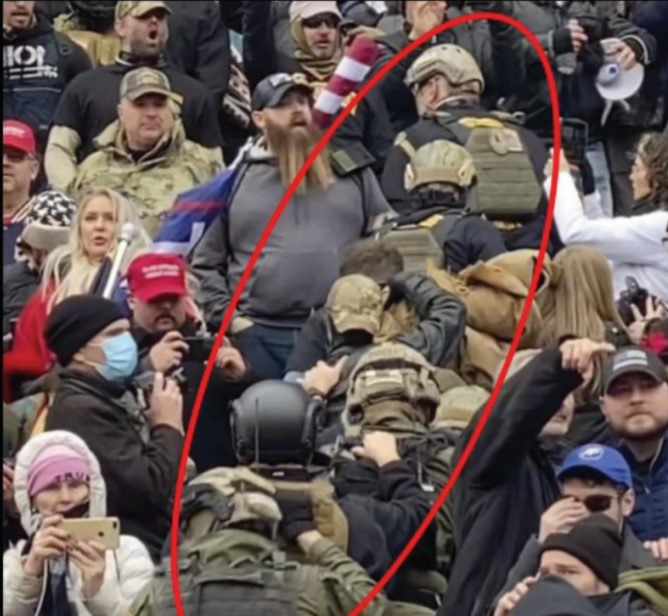
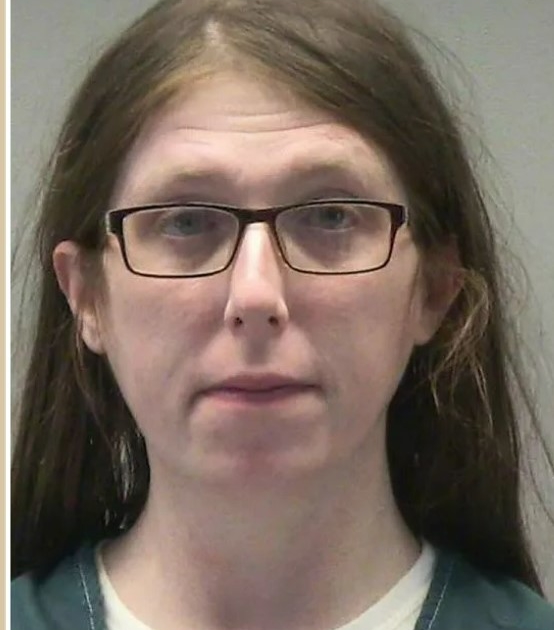
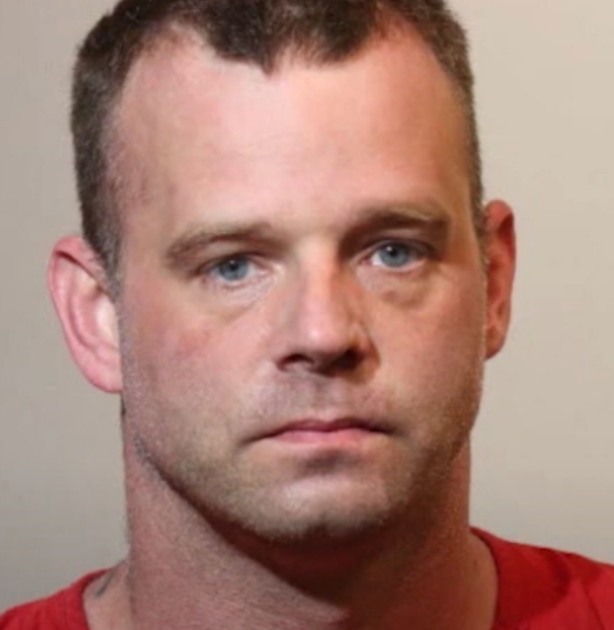

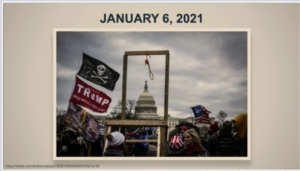
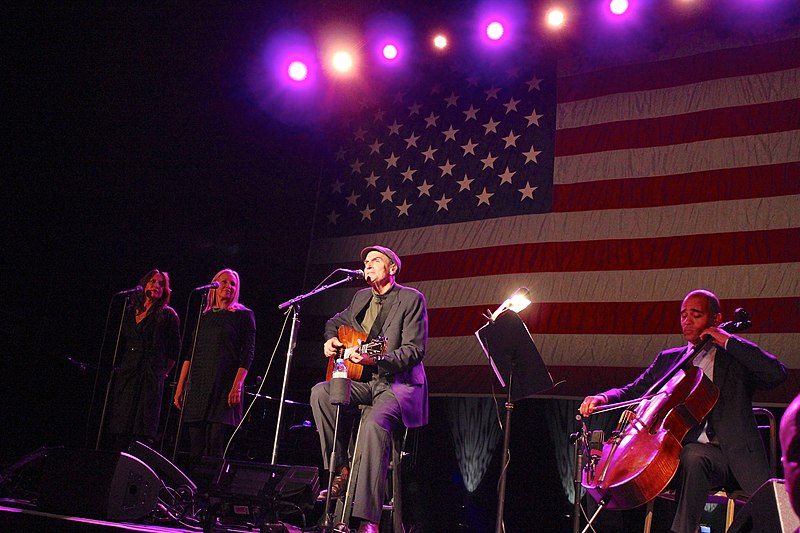 CC BY 2.0
CC BY 2.0